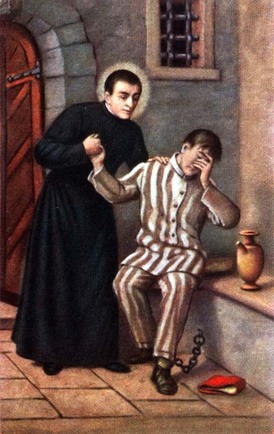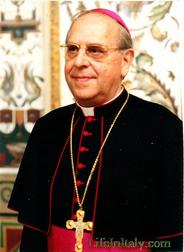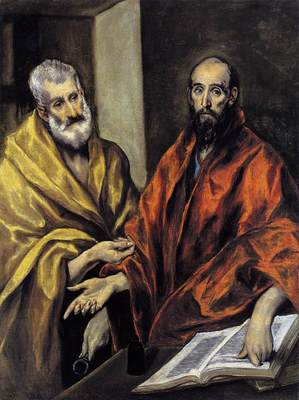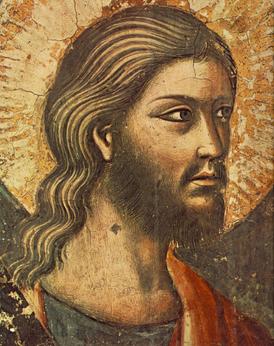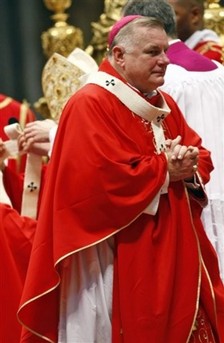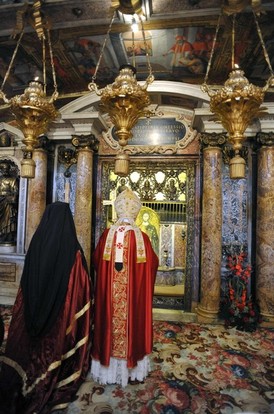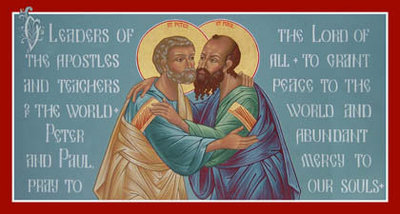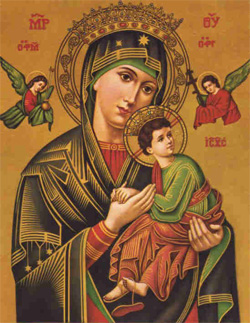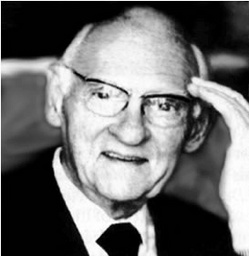Saint Joseph Cafasso: patron for prisoners and spiritual directors
The Pope’s weekly general audience address today was
dedicated to Saint Joseph Cafasso (1811-1860), a member of the “St Francis of
Assisi Institute,” a priest (ordained in 1833) who died 150 years ago. He is
most known as Saint John Bosco’s spiritual father (director) from 1835 to 1860.
Cafasso died in 1860; Pius XII canonized in him 1947. In 1948, Pope Pius XII named him the patron of Italian
prisons and, in 1950, proposed him “as a model for priests involved in
Confession and spiritual direction.” His uncle is Blessed Joseph Allamano. Saint Joseph Cafasso’s feast day is June 23.
I never heard of Saint Joseph Cafasso
until today, partly because I am not well attuned to the life of Saint John
Bosco of which he seems to be most connected. According to the Benedict, Joseph
Cafasso’s ministry helped to form “the true pastor with a rich interior life
and a profound zeal for pastoral care: faithful in prayer, committed to
preaching and catechesis, dedicated to the Sacraments of the Eucharist and
Confession, in keeping with the model incarnated by St. Charles Borromeo and
St. Francis of Sales, and promoted by the Council of Trent. St. Joseph Cafasso
sought to establish this model in the formation of young priests so that, in
their turn, they too could become formators to other priests, religious and lay
people, thus creating a unique and effective chain.” AND how could anyone NOT take Saint Joseph Cafasso as a paradigm for Christian life?
A theme that I am picking
up these days from some of the Pope’s addresses is the constant need to stay in
the “state of grace.” You might say, “no Kidding, Paul! Really?” Mock if you want, but there is an increasing distancing from God, especially staying close to God by means of staying in
a state of grace through the sacrament of confession. We know that the pure of heart are the ones who inherit the kingdom of God. One of the things we know
of Saint John Vianney is that he devoted himself to confessional. Cafasso, the
Pope said, “loved the Lord totally, he was animated by a well-rooted faith and
supported by profound and prolonged prayer, he showed sincere charity to
everyone. He knew moral theology but was equally well aware of the condition of
people’s hearts for which, like the good shepherd, he took responsibility.”
Benedict
XVI explained that that Saint John Bosco never copied his master. Not an
insignificant point: we need to take under consideration those who guide us but
we also need to assert our independence from a “master teacher” in order for
grace to flourish. Otherwise we
merely parrot the other in an unthinking manner. The Pope said, “He
imitated him in the human and priestly virtues – defining him as a ‘model of
priestly life’ – but maintained his own attitudes and his own specific
vocation. … This is a precious lesson for those involved in the formation and
education of the young generations.”
What may be interesting for us to
know is that Saint Joseph Cafasso was renown for his “concern for the lowest, especially for prisoners
… who lived in inhuman and dehumanizing conditions.” Characteristic of Cafasso’s
work with prisoners is remembered today as he “often delivered great sermons
that came to involve almost the entire prison population, with the passage of
time he came to favor individual catechesis, made up of conversations and
personal meetings. While respecting the individual situation of each
individual, he tackled the great themes of Christian life, speaking of trust in
God, adherence to His will, the utility of prayer and the Sacraments, the
culmination of which is Confession, the meeting with God Who, for us, becomes
infinite mercy.”
The environment shows us God’s creative activity –what ought to be our response?
Archbishop Antonio Maria Vegliò, president of the Pontifical
Council for the Pastoral Care of Migrants and Itinerant Peoples,
published a letter today for World Tourism Day addressing the theme of “Tourism
and Biodiversity” as proposed by the World Tourism Organization; the theme of
“International Year for Biological Diversity” was adopted by the General
Assembly of the United Nations in 2006. As Archbishop Vegliò noted, “This
proclamation was born of the deep concern for ‘the social, economic,
environmental and cultural implications of the loss of biodiversity, including
negative impacts on the achievement of the Millennium Development Goals, and
stressing the necessity to adopt concrete measures in order to reverse it.'”
This
particular Council, according to the 1987 Apostolic Constitution Pastor Bonus,
has as its work the “pastoral solicitude of the Church to the particular needs
of those who have been forced to abandon their homeland, as well as to those
who have none” (149) and “is committed to assuring that journeys undertaken for
reasons of piety, study or relaxation may aid in the moral and religious
formation of the faithful; It assists particular Churches so that all those who
are far from home may be given adequate pastoral assistance (151). It also
oversees the Apostleship of the Sea.
The Church intensively cares for, is present to, the welfare
of her children, indeed, she wants the happiness of all peoples, regardless of people’s particulars. Why are these
paragraphs important to me and perhaps to you? Because Archbishop Vegliò focuses our attention on the
creative action of God in making the world ex nihilo and that He sustains us. I
don’t believe the Church is being politically correct in advocating “green theology”
because it is fashionable. And, I don’t think it would be acceptable to be
dismissive of matters pertaining to the environment; whether we realize it or not, proper balance and respect for the environment is
necessary for us today and in the future. This is why I think that dioceses, parishes, monasteries and school –in short, all constituencies– ought to incorporate in their pastoral programs a proper catechesis on various subjects that promote and develop an environmental perspective. Catholics ought to take charge in being environmentally sensitive
because of our fundamental belief that God is the creator of world, it is Scripturally well-founded, that God is the
creator of us personally and because we care for all things that allow our
humanity to thrive; and not least is the fact that all things are given for
sustaining our life and giving glory to God. In other words, we really can’t
opt out of caring for the environment and calling those who abuse the
environment on the micro and macro levels to be accountable. I wonder if one can argue that it is a mortal sin to abuse the environment. Respect for our biodiversity is not only a matter of faith and reason but our faith and good public order.
Nevertheless, Vegliò shows us
that the Church is providing leadership for an authentic environmental
perspective and goal that is truly human and humane. All our work should be
balanced, reasonable and sustainable for the common good.
Some pertinent paragraphs of Archbishop
Vegliò’s letter follows:
As Pope Benedict XVI points out in his Encyclical
letter Caritas in veritate, “in nature, the believer recognizes the wonderful
result of God’s creative activity, which we may use responsibly to satisfy our
legitimate needs, material or otherwise, while respecting the intrinsic balance
of creation” (48) and whose use represents for us “a responsibility towards the
poor, towards future generations and towards humanity as a whole” (49). For
this tourism must be respectful of the environment, looking to reach a perfect
harmony with creation, so as to guarantee the sustainability of the resources
on which it depends, while not leading to irreversible ecological
transformations.
Contact with nature is important and therefore tourism must
make an effort to respect and value the beauty of creation, from the conviction
that “many people experience peace and tranquility, renewal and
reinvigoration, when they come into close contact with the beauty and harmony
of nature. There exists a certain reciprocity: as we care for creation, we
realize that God, through creation, cares for us” (Benedict XVI, World Day of
Peace 2010 message, 13).
There is an element that makes even this effort more
imperative than ever. In the search for God, the human being discovers ways to
bring himself closer to the Mystery, which has creation as a starting point
(CCC 31). Nature and biological diversity speak to us of God Creator, He that
makes himself present in His creation, “for from the greatness and the
beauty of created things their original author, by analogy, is seen (Wis. 13:5),
“for the original source of beauty fashioned them.” (Wis. 13:3) This
is why the world, in its diversity, “presents itself before man’s eyes as
evidence of God, the place where his creative, providential and redemptive
power unfolds” (CSD 487) For this reason, tourism, bringing us closer to
creation in its variety and wealth, can be an occasion to promote and increase
the religious experience.
All of this makes looking for a balance between
tourism and biological diversity, in which they mutually support each other,
urgent and necessary, so that economic development and environmental protection
do not appear as opposed and incompatible elements, but rather that there is a
tendency to reconcile the demands of both (CSD 470).
Pallium Mass 2010: a guarantee of freedom, charity and unity, the Pope reminds
Though they suffered on different days, Saints Peter and Paul are known as one, as Saint Augustine reminds.
In first hearing and then reading the papal homily I noticed some very crucial points for us to reflect upon and to seriously consider: the real persecution of the Church today and the impact on Catholic identity exists not exclusively from outside the Church (a theme the pope has stated before now) but from the faithful’s betrayal of the faith, of Truth. When secularism, not to be confused with secularity, infiltrates the Church the true message of the Gospel is obscured and our hearts are darkened.
As usual on today’s solemn feast of Peter and Paul, Pope Benedict bestowed the pallium, the symbol of theological, juridical and fraternal communion between the pope and a bishop. It is also a symbol of the “fullness of charity and unity.” In seeing the pallium we see, as Benedict says, a symbol of “the guarantee of freedom for the Church’s Pastors and the Communities.” Today, 38 archbishops from around the world received the pallium, including three archbishops from the USA and one from Canada.
The Pope’s exhortation and prayer upon giving the pallium:
To the glory of God and the praise of the Blessed Virgin Mary and of the apostles Peter and Paul, and of the Holy Roman Church, for the honor of the Churches, which have been placed in your care, and as a symbol of your authority as metropolitan archbishop: We confer on you the pallium taken from the tomb of Peter to wear within the limits of your ecclesiastical provinces.
And then
May this pallium be a symbol of unity and a sign of your communion with the Apostolic See, a bond of love, and an incentive to courage. On the day of the coming and manifestation of our great God and chief shepherd, Jesus Christ, may you and the flock entrusted to you be clothed with immortality and glory. In the name of the Father, and of the Son and of the Holy Spirit.
Below is Benedict’s homily for today’s Mass (with my own points of emphasis).
The biblical
texts of this Eucharistic Liturgy of the Solemnity of Saints Peter and Paul, in
their great wealth, highlight a theme that could be summarized thus: God is
close to his faithful servants and frees them from all evil, and frees the
Church from negative powers. It is the theme of the freedom of the Church,
which has a historical aspect and another more deeply spiritual one.
This theme
runs through today’s Liturgy of the Word. The first and second readings speak,
respectively, of St Peter and St Paul, emphasizing precisely the liberating
action of God in them. Especially the text from the Acts of the Apostles
describes in abundant detail the intervention of the Angel of the Lord, who
releases Peter from the chains and leads him outside the prison in Jerusalem,
where he had been locked up, under close supervision, by King Herod (cf. at
12.1 to 11). Paul, however, writing to Timothy when he feels close to the end
of his earthly life, takes stock which shows that the Lord was always near him
and freed him from many dangers and frees him still by introducing him into His
eternal Kingdom (see 2 Tim 4, 6-8.17-18). The theme is reinforced by the
Responsorial Psalm (Ps 33), and also finds a particular development in the
Gospel of Peter’s confession, where Christ promises that the powers of hell
shall not prevail against his Church (cf. Mt 16:18).
Observing closely we note
a certain progression regarding this issue. In the first reading a specific
episode is narrated that shows the Lord’s intervention to free Peter from
prison. In the second Paul, on the basis of his extraordinary apostolic
experience, is convinced that the Lord, who already freed him “from the
mouth of the lion “delivers him” from all evil”, by opening the
doors of Heaven to him. In the Gospel we no longer speak of the individual
Apostles, but the Church as a whole and its safekeeping from the forces of
evil, in the widest and most profound sense. Thus we see that the promise of
Jesus – “the powers of hell shall not prevail” on the Church – yes,
includes the historical experience of persecution suffered by Peter and Paul
and other witnesses of the Gospel, but it goes further, wanting to protect
especially against threats of a spiritual order, as Paul himself writes in his
Letter to the Ephesians: ” For our struggle is not with flesh and blood
but with the principalities, with the powers, with the world rulers of this
present darkness, with the evil spirits in the heavens”(Eph 6:12).
Indeed,
if we think of the two millennia of Church history, we can see that – as the
Lord Jesus had announced (cf. Mt 10.16-33) – Christians have never been lacking
in trials, which in some periods and places have assumed the character of real
persecution. These, however, despite the suffering they cause, are not the
greatest danger for the Church. In fact it suffers greatest damage from what
pollutes the Christian faith and life of its members and its communities,
eroding the integrity of the Mystical Body, weakening its ability to prophesy
and witness, tarnishing the beauty of its face. This reality is already
attested in the Pauline Epistle. The First Epistle to the Corinthians, for
example, responds to some problems of divisions, inconsistencies, of infidelity
to the Gospel which seriously threaten the Church. But the Second Letter to
Timothy – of which we heard an excerpt – speaks about the dangers of the
“last days”, identifying them with negative attitudes that belong to
the world and can infect the Christian community: selfishness, vanity, pride,
love of money, etc. (cf. 3.1 to 5). The Apostle’s conclusion is reassuring: men
who do wrong – he writes – “will not make further progress, for their
foolishness will be plain to all” (3.9). There is therefore a guarantee of
freedom promised by God to the Church, it is freedom from the material bonds
that seek to prevent or coerce mission, both through spiritual and moral evils,
which may affect its authenticity and credibility.
The theme of the freedom of
the Church, guaranteed by Christ to Peter, also has a specific relevance to the
rite of the imposition of the pallium, which we renew today for thirty-eight
metropolitan archbishops, to whom I address my most cordial greeting, extending
with it affection to all who have wanted to accompany them on this pilgrimage.
Communion with Peter and his successors, in fact, is the guarantee of freedom
for the Church’s Pastors and the Communities entrusted to them. It is
highlighted on both levels in the aforementioned reflections. Historically,
union with the Apostolic See, ensures the particular Churches and Episcopal
Conferences freedom with respect to local, national or supranational powers,
that can sometimes hinder the mission of the ecclesial Church. Furthermore, and
most essentially, the Petrine ministry is a guarantee of freedom in the sense
of full adherence to truth and authentic tradition, so that the People of God
may be preserved from mistakes concerning faith and morals. Hence the fact that
each year the new Metropolitans come to Rome to receive the pallium from the
hands of the Pope, must be understood in its proper meaning, as a gesture of
communion, and the issue of freedom of the Church gives us a particularly
important key for interpretation. This is evident in the case of churches
marked by persecution, or subject to political interference or other hardships.
But this is no less relevant in the case of communities that suffer the
influence of misleading doctrines or ideological tendencies and practices
contrary to the Gospel. Thus the pallium becomes, in this sense, a pledge of
freedom, similar to the “yoke” of Jesus, that He invites us to take
up, each on their shoulders (Mt 11:29-30). While demanding, the commandment of
Christ is “sweet and light” and instead of weighing down on the bearer,
it lifts him up, thus the bond with the Apostolic See – while challenging –
sustains the Pastor and the portion of the Church entrusted to his care, making
them freer and stronger.
I would like to draw a final point from the Word of
God, in particular from Christ’s promise that the powers of hell shall not
prevail against his Church. These words may also have a significant ecumenical
value, since, as I mentioned earlier, one of the typical effects of the Devil
is division within the Church community. The divisions are in fact symptoms of
the power of sin, which continues to act in members of the Church even after
redemption. But the word of Christ is clear: ” Non praevalebunt – it will
not prevail” (Matt. 16:18). The unity of the Church is rooted in its union
with Christ, and the cause of full Christian unity – always to be sought and
renewed from generation to generation – is well supported by his prayer and his
promise. In the fight against the spirit of evil, God has given us in Jesus the
‘Advocate’, defender, and after his Easter, “another Paraclete” (Jn
14:16), the Holy Spirit, which remains with us always and leads the Church into
the fullness of truth (cf. Jn 14:16; 16:13), which is also the fullness of
charity and unity. With these feelings of confident hope, I am pleased to greet
the delegation of the Patriarchate of Constantinople, which, in the beautiful
custom of reciprocal visits, participates in the celebrations of the patron
saints of Rome. Together we thank God for progress in ecumenical relations
between Catholics and Orthodox, and we renew our commitment to generously
reciprocate to God’s grace, which leads us to full communion.
Dear friends, I
cordially greet all of you: Cardinals, Brother Bishops, Ambassadors and civil
authorities, in particular the Mayor of Rome, priests, religious and lay
faithful. Thank you for your presence. May the Saints Peter and Paul help you
to grow in love for the holy Church, the Mystical Body of Christ the Lord and
messenger of unity and peace for all men. May they also help you to offer the
hardships and sufferings endured for fidelity to the Gospel with joy for her
holiness and her mission. May the Virgin Mary, Queen of Apostles and Mother of
the Church, always watch over you and especially over the Ministry of
metropolitan archbishops. With her heavenly help may you always live and act in
that freedom that Christ has won for us. Amen.
Following Christ unfolds
Saints Peter and Paul
J. Michael Thompson
Copyright © 2010, World Library Publications
87 87 D; HYMN TO JOY, NETTLETON
Our Lady of Perpetual Help
Hans Urs von Balthasar: 22nd anniv
- Born on August 12, 1905
- Ordained priest on July 26, 1939
- Incardinated in the Diocese of Chur in 1950
- Nominated cardinal deacon on June 28, 1988 and assigned the title of S. Nicola in Carcere
- Died on June 26, 1988
Saint Josemaría Escrivá
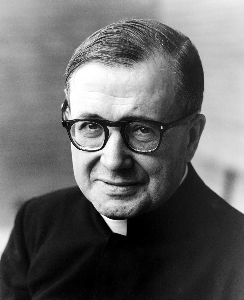 O God, through the mediation of Mary our Mother, You granted Your priest Saint Josemaría countless graces, choosing him as a most faithful instrument to found Opus Dei, a way of sanctification in daily work and in the fulfillment of the Christian’s ordinary duties. Grant that I, too, may learn to turn all the circumstances and events of my life into occasions of loving You and serving the Church, the Pope and all souls with joy and simplicity, lighting up the pathways of this earth with faith and love. Deign to grant me, through the intercession of Saint Josemaría, the favor of … (make your request). Amen.
O God, through the mediation of Mary our Mother, You granted Your priest Saint Josemaría countless graces, choosing him as a most faithful instrument to found Opus Dei, a way of sanctification in daily work and in the fulfillment of the Christian’s ordinary duties. Grant that I, too, may learn to turn all the circumstances and events of my life into occasions of loving You and serving the Church, the Pope and all souls with joy and simplicity, lighting up the pathways of this earth with faith and love. Deign to grant me, through the intercession of Saint Josemaría, the favor of … (make your request). Amen.
DiNoia on the challenges to faith in Christ
Claudia McDonnell’s article in the Catholic New York, “Faith and Reasoning,” gives a digest of the talk and issues.

